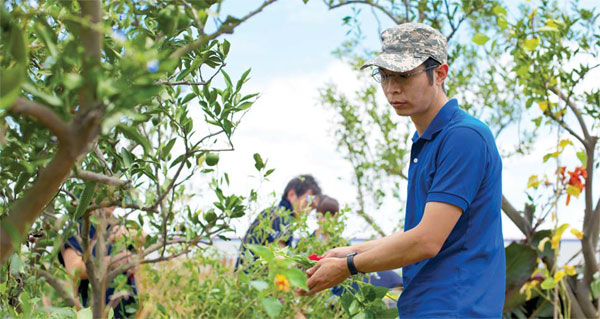Rural areas are given a modern makeover

A man with a passion for preserving heritage wants to ensure villages around China stay in touch with contemporary life
An important social movement in China took place early in the 20th century when scholar Liang Shuming called on intellectuals to boost the reform of rural areas stricken by extreme poverty after years of war.
As part of efforts to improve the quality of life in these areas, scholars set up schools and came up with measures to upgrade agricultural technology. The movement continued for seven years until the start of the War of Resistance Against Japanese Aggression (1937-45).
| Zhu Shengxuan leased an abandoned farm from the Deqing local government in Zhejiang province and is going all out to find new ways to repurpose China's villages and entice more people to come back and live in the countryside. Provided to China Daily |
A century has since passed, and some young intellectuals still hold onto a similar dream, although the movement has now taken on a new meaning - to preserve culture and heritage.
Zhu Shengxuan is one such supporter. Formerly a landscape design consultant for the Shanghai Expo, he decided to leave the industry after receiving cancer treatment in 2010, which spurred him to rethink his life and career.
"I began to realize that the more landscapes I designed, the further away I got from the green fields," says the 40-year-old architect, whose father is a farmer. "I can't leave my city life, but I can't give up countryside land, either."
Although he has lived in Shanghai for more than 10 years, Zhu says he still has a strong emotional connection to his village in Baoshan, Yunnan province. After recovering from an operation to treat his cancer, he returned to the countryside to lead a healthier lifestyle.
Minimal pollution
In 2011, Zhu visited the Moganshan Mountains in Zhejiang province. There, he discovered that because the area's water source was designated as a protected zone by the authorities, all conventional livestock and farming practices in the vicinity were outlawed to minimize pollution.
Many people in the affected areas who had relied primarily on farming to make a living now had no means to earn an income. Many young people soon left to work in the cities, leaving their elderly parents behind. Many homes were left vacant, and swathes of land left untouched.
The scene sparked an idea in Zhu. In 2012, he decided to use his money to lease an abandoned farm from the local government for 20 years. With an investment of 8 million yuan ($1.2 million; 1.09 million euros), he went about introducing reforms in the village, repurposing old houses and combining them to form a 13-room boutique hotel.
Nearby, he grew corn, sweet potatoes and a variety of other vegetables without the use of pesticide.
However, Zhu was still not satisfied. He knew almost all the traditional industries in Moganshan, including harvesting bamboo as a raw construction material, were not going to develop anymore. To ensure the village remained relevant in the modern era, he renovated an abandoned silkworm farm at the foot of the mountain, turning it into a creative arts space featuring traditional handicrafts, such as cotton shoes, as well as a cafe, tea house, bicycle club, bookstore, theater and design studio.
"I'm looking for ways to entice more people to come back and stay in the countryside. I want to build a bridge to promote interaction between cities and countryside. Rural reform needs government policy support, but it also needs contributions from individuals," says Zhu, who is also involved in other village reform projects and has set up the Shanghai Urban and Countryside Interactive Development Center.
Local input
Before creating the blueprint for his new village reform project in Kunshan city in Jiangsu province, Zhu talked to most of the 142 families in the area to find out what were the things they hoped to retain. This is because he believes it is imperative that, regardless of how beautiful new architecture is, traditions have to be kept alive.
Xue Rongquan echoes this view. The 75-year-old farmer wants to keep the old fishing boat that he has had since he was 15. "When the reforms are completed next year, I'd like to come back and help build up a farming team to plant rice," he adds.
Zhu's efforts have not gone unnoticed by the authorities. After all, the Chinese government has in recent times emphasized the need to fully utilize empty houses and vacant land to develop traditional handicrafts, agriculture and tourism.
Together with the local authorities in Kunshan, Zhu will also be setting up a gallery comprising items from many of the old farmers, such as a 100-year-old millstone and brick sculptures of tigers. One of the goals is to draw more visitors from the cities to learn about the local culture and way of life.
"Young people from rural areas don't necessarily need to migrate to big cities. With such reforms, land will be valuable and their lives can actually be more comfortable than in urban areas," he says. "In the near future, more and more people from the cities will also be willing to relocate to villages, be it to change their lifestyles or to run businesses."
xuxiaomin@chinadaily.com.cn
(China Daily European Weekly 04/29/2016 page17)
Today's Top News
- Takaichi must stop rubbing salt in wounds, retract Taiwan remarks
- Millions vie for civil service jobs
- Chinese landmark trade corridor handles over 5m TEUs
- China holds first national civil service exam since raising eligibility age cap
- Xi's article on CPC self-reform to be published
- Xi stresses improving long-term mechanisms for cyberspace governance































